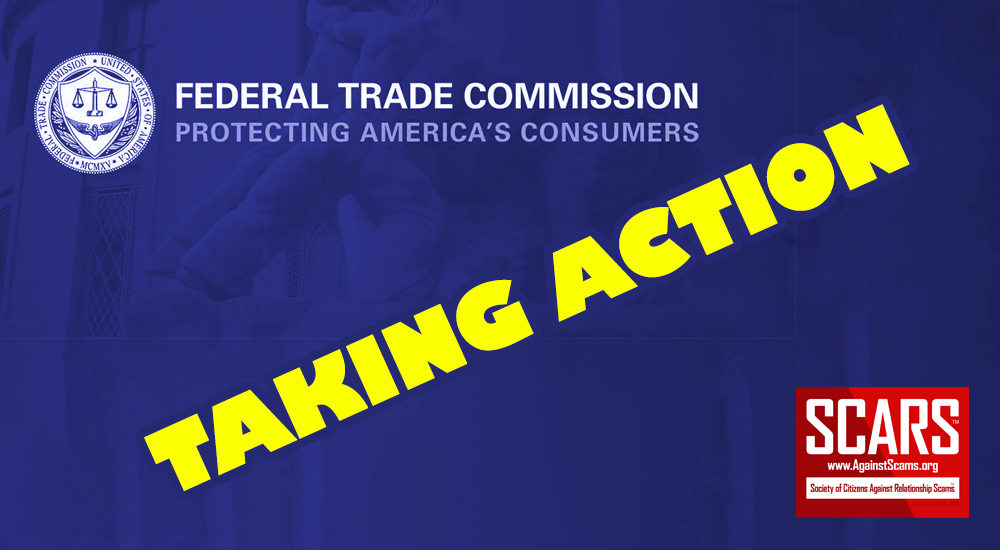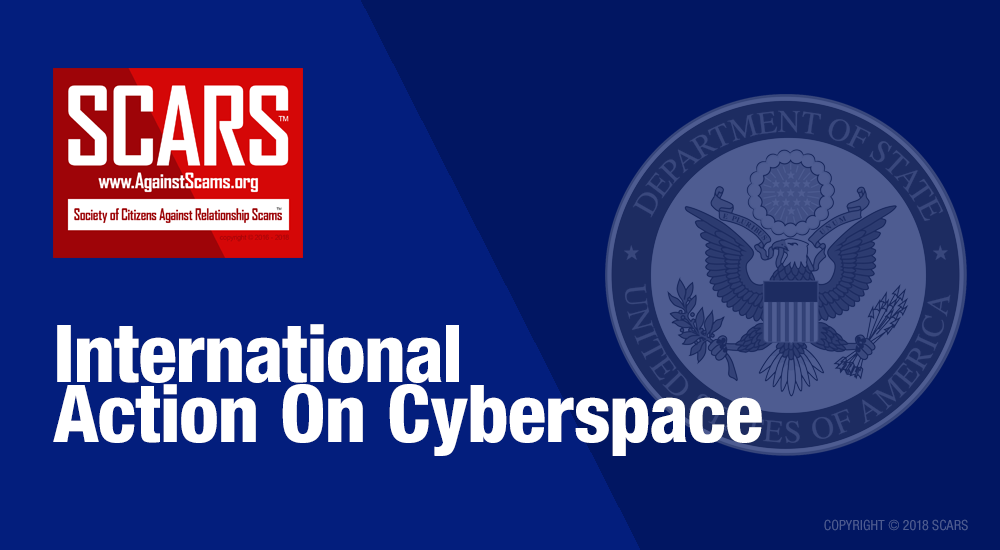
SCARS Institute’s Encyclopedia of Scams™ Published Continuously for 25 Years

SCARS™ Special Report: Historic International Statement Signed
Joint Statement on Advancing Responsible State Behavior in Cyberspace Signed This Week!
As a result of President Trump’s recent activity with the United Nations progress is being achieved in many areas, and this is but one.
27 NATIONS INK CYBERSECURITY PLEDGE
Twenty-seven nations signed a statement today reaffirming their commitment to constructing a framework for responsible state behavior in cyberspace.
The statement, Advancing Responsible State Behavior in Cyberspace, created a framework for the nations to show their continuing support for the international rules-based order, and encourage its adherence, implementation, and further development, including at the ongoing UN negotiations of the Open-Ended Working Group and Group of Governmental Experts.
“We support targeted cybersecurity capacity building to ensure that all responsible states can implement this framework and better protect their networks from significant disruptive, destructive or otherwise destabilizing cyber activity. We reiterate that human rights apply and must be respected and protected by states online, as well as offline, including when addressing cybersecurity,” the nations said in a statement issued by the U.S. State Department.
The countries that signed are: Australia, Belgium, Canada, Colombia, the Czech Republic, Denmark, Estonia, Finland, France, Germany, Hungary, Iceland, Italy, Japan, Latvia, Lithuania, the Netherlands, New Zealand, Norway, Poland, the Republic of Korea, Romania, Slovakia, Spain, Sweden, the United Kingdom and the United States.
“This statement provides a support structure for the United States and our allies to further unite and coordinate cyber efforts to defend our infrastructure(s) from nation-states and hackers, as well as help to better protect our citizens against ongoing information operations by Russia and other adversaries,” said Rosa Smothers, senior VP of cyber operations at KnowBe4.
The group added it is willing to work together to hold states accountable when they act contrary to these ideals by taking measures that are transparent and consistent with international law.
“There must be consequences for bad behavior in cyberspace,” the pledge stated.
The announcement came as the UN General Assembly was set to meet in New York.
Formal Text
The following text is a joint statement affirmed by these countries: Australia, Belgium, Canada, Colombia, the Czech Republic, Denmark, Estonia, Finland, France, Germany, Hungary, Iceland, Italy, Japan, Latvia, Lithuania, the Netherlands, New Zealand, Norway, Poland, the Republic of Korea, Romania, Slovakia, Spain, Sweden, the United Kingdom, and the United States – dated September 23, 2019.
Begin Text
Joint Statement on Advancing Responsible State Behavior in Cyberspace
Information technology is transforming modern life, driving innovation and productivity, facilitating the sharing of ideas, of cultures, and promoting free expression. Its benefits have brought the global community closer together than ever before in history. Even as we recognize the myriad benefits that cyberspace has brought to our citizens and strive to ensure that humanity can continue to reap its benefits, a challenge to this vision has emerged. State and non-state actors are using cyberspace increasingly as a platform for irresponsible behavior from which to target critical infrastructure and our citizens, undermine democracies and international institutions and organizations, and undercut fair competition in our global economy by stealing ideas when they cannot create them.
Over the past decade, the international community has made clear that the international rules-based order should guide state behavior in cyberspace. UN member states have increasingly coalesced around an evolving framework of responsible state behavior in cyberspace (framework), which supports the international rules-based order, affirms the applicability of international law to state-on-state behavior, adherence to voluntary norms of responsible state behavior in peacetime, and the development and implementation of practical confidence building measures to help reduce the risk of conflict stemming from cyber incidents. All members of the United Nations General Assembly have repeatedly affirmed this framework, articulated in three successive UN Groups of Governmental Experts reports in 2010, 2013, and 2015.
We underscore our commitment to uphold the international rules-based order and encourage its adherence, implementation, and further development, including at the ongoing UN negotiations of the Open Ended Working Group and Group of Governmental Experts. We support targeted cybersecurity capacity building to ensure that all responsible states can implement this framework and better protect their networks from significant disruptive, destructive, or otherwise destabilizing cyber activity. We reiterate that human rights apply and must be respected and protected by states online, as well as offline, including when addressing cybersecurity.
As responsible states that uphold the international rules-based order, we recognize our role in safeguarding the benefits of a free, open, and secure cyberspace for future generations. When necessary, we will work together on a voluntary basis to hold states accountable when they act contrary to this framework, including by taking measures that are transparent and consistent with international law. There must be consequences for bad behavior in cyberspace.
We call on all states to support the evolving framework and to join with us to ensure greater accountability and stability in cyberspace.
End Text
In addition to the above, we include the remarks of John J. Sullivan, Deputy Secretary Of State, at the Palace Hotel, New York, NY on September 23, 2019
DEPUTY SECRETARY SULLIVAN: Well, good morning, everyone, and thank you for being here. It’s great to see many familiar faces in the room. This is a very important ministerial on advancing responsible state behavior in cyberspace, and I especially want to thank our co-hosts, the Netherlands and Australia, and our distinguished panelists, the foreign ministers of both, for being here. It’s a tremendous honor to be joined today with member-states who share our commitment to the goal of global cyber stability. We are gratified by the support for this event and the joint statement we look forward to releasing at its conclusion.
In the 21st century, all facets of life are being connected through the internet, making cybersecurity critical to protecting our property, our families, and our ways of life. Fostering responsible state behavior in cyberspace is now integral to safeguarding international peace and security.
This is a challenge that must not be left to technical experts alone. Yes, better network defense can make our systems more secure, but security in cyberspace requires broad international engagement. Diplomacy is the tool that the international community has always used to set expectations for how states should behave. We must apply this approach to our discussions about cyberspace. This issue needs the sustained attention of ministers and other senior diplomats. That is why we convened a high-level event on this subject here in New York one year ago, and that is why this meeting today is so important.
The stakes are moving higher as more governments develop offensive cyber programs and as we see more frequent and severe cyber incidents. In 2017, we witnessed the reckless and uncontrolled WannaCry and NotPetya cyber attacks – both carried out by states – that caused billions of dollars of damage across Europe, Asia, and the Americas. It is clear states are increasingly deploying more sophisticated capabilities that threaten our cybersecurity.
We as an international community must come together to mainstream and make universal well-established standards for state behavior in cyberspace and hold accountable those who transgress them.
Today we meet on the first day of the General Assembly’s high-level week because the United Nations is a venue where we have already made great progress in building consensus around responsible state behavior in cyberspace. It is also where we expect to see significant work on this topic unfold over the next two years.
My message today is twofold: First, the United States is prepared to work with all UN members to safeguard the extraordinary benefits of cyberspace; and second, we must redouble our efforts – and not just in New York or in Geneva – to create accountability for state actions in cyberspace.
All of the governments here today share a broad and common vision of the requirements to maintain peace, security, and stability in cyberspace. We have forged this vision over a decade through negotiations at the UN and in regional bodies, through our daily engagements with each other, and through information sharing, coordination of messaging, and other cooperative actions to prevent, mitigate, and respond to significant cyber incidents.
Almost exactly a year ago, the United States reaffirmed its commitment to this vision in our National Cyber Strategy. We are very proud of this strategy, and this meeting today is a fitting way for us to mark the anniversary. In the last year, we have taken steps domestically to protect our supply chains, strengthen our cybersecurity workforce, and improve network defense. The State Department leads in implementing many of the international elements of the strategy, which have direct bearing on our work here at the United Nations.
Pillar III of the National Cyber Strategy is aptly named “Preserve Peace through Strength.” It commits the United States to “promote a framework of responsible state behavior in cyberspace built upon international law, adherence to voluntary non-binding norms of state behavior that apply during peacetime, and the consideration of practical confidence-building measures to reduce the risk of conflict.”
Broad international consensus around these three elements – international law, peacetime norms, and confidence-building measures – is the signature accomplishment of cyber diplomacy in the last decade. The consensus reports of the 2010, 2013, and 2015 Group of Governmental Experts presents the elements of this framework. The UN General Assembly, through 2015, ’16, and ’18 resolutions, reaffirmed that all states should follow the reports’ recommendations. Our National Cyber Strategy commits the United States to preserve and build upon this accomplishment even as certain states appear poised to undermine it.
We believe the time is now to prioritize universalization and implementation of the Framework for Responsible State Behavior, because doing so is in all states’ interests. That’s why cyber capacity-building forms an integral element of our National Cyber Strategy, and I know many of our partners here are particularly committed to this as well. In our interconnected world, we are only as strong as our weakest link. We must work to ensure that states that want to act responsibly in cyberspace have the means to do so, which includes protecting their networks from malicious state and non-state actors. To this end, since 2014, the State Department alone has invested more than $70 million to build cyber capacity and strengthen the fight against cyber crime.
The priorities I have just described will guide our strategy in the coming UN negotiations on international security issues in cyberspace. Over the next two years, we will engage in not one but two negotiation processes: another UN Group of Governmental Experts and a new Open-Ended Working Group. Some expect these parallel processes will create tension. We in the
United States, on the other hand, view them as opportunities, provided that we can hold the line against attempts to rewrite our past consensus achieved here.
We will look to Ambassador Patriota from Brazil and Ambassador Lauber from Sweden[1] to refine critical guidance to states and identify ways to improve capacity across the board. Our hope is to reach consensus in both venues, and we’re prepared to work with all well-intentioned states to achieve this goal.
As we make a concerted effort together to achieve success in the coming negotiations, we also must not lose sight of what matters most to our people: safety and security from malicious cyber activities. To accomplish this, we need all states not only to adopt the Framework for Responsible State Behavior, but most importantly to abide by it.
Sadly, the record has been mixed in recent years. We have seen cyber attacks on critical infrastructure, like the 2017 NotPetya example I cited earlier; cyber-enabled election interference in a number of countries; and state-sponsored theft of trade secrets for commercial gain. While we should be proud of our efforts to identify nonbinding norms for responsible state behavior over the last decade, we have yet to build mechanisms to hold – for holding accountable states that transgress those norms.
We need to work together to do this now.
We need all responsible states to stand together against destructive, disruptive, or otherwise destabling[2], malicious cyber activity carried out by states during peacetime. We must work in concert to ensure that there are consequences for bad behavior in cyberspace, drawing upon all elements of national power, not just cyber capabilities. We need to build cooperation among responsible states to deliver those consequences where appropriate and consistent with international law.
We are encouraged to see a growing number of governments working together to condemn malicious cyber activity. From WannaCry to the APT10 Cloud Hopper incidents, more and more countries are attributing cyber attacks or issuing statements of support to those states that do attribute. But we need to do more.
Today, 26 countries, including the United States, have signed a Joint Statement on Advancing Responsible State Behavior in Cyberspace, and we encourage other countries to join us. We hope those who have not signed will do so today. This statement reflects our shared commitment to work together to continue to advance the framework of responsible state behavior, including through the upcoming UN negotiations, and to work together to ensure accountability for adherence to that framework.
So thank you again for the honor and privilege of speaking with you today. We have a tremendous opportunity before us to advance peace, security, and prosperity in the years to come. And now it’s my honor to introduce my esteemed colleague, Foreign Minister Stef Blok of the Kingdom of the Netherlands. Stef.
FOREIGN MINISTER BLOK: Well, excellencies, ladies and gentlemen, the joint statement that my colleague John Sullivan and Marise Payne and I are presenting here today underscores our shared commitment to upholding the international rules-based order.
Events over the past decade have demonstrated that if a hard dividing line between cyberspace and the real, physical world has ever existed, it is now fading fast. Interference in democratic processes, cyber operation against national and international institutions, and the hacking of private companies have become commonplace. As such, cyberspace has become inseparable from the rest of our lives. The invisible ties that bind our world ever more closely are largely made up of ones and zeros, and when we talk about a buzzword like connectivity, we must recognize that it’s cyberspace that facilitates most of the connections involved.
Information technology is the flame that powers rapid advances in innovation and productivity, and it facilitates the sharing of ideas beyond borders. It is, however, a Promethean flame. While this fascinating technology has given humanity access to previously unthinkable levels of knowledge and connectedness, it has also given both state and non-state actors a powerful new tool for inflicting harm. And like Prometheus’s fire, it can be used to spread light and warmth where before there was cold and darkness. But it can just as easily be used to spread chaos and despair, crippling the world it was meant to illuminate.
Actions in cyberspace have direct impact in the physical world. When cyber operations are directed against vital infrastructure or government, the artificial barrier between online and offline doesn’t matter anymore. When a distributed denial-of-service attack makes government services unavailable to the public or when a cyber attack cripples the financial infrastructure of a state, the harmful effects will be felt immediately and widely. If such disruption were to occur in the physical world, there would be little doubt about how to respond. There is a clearly established body of international law in place, a framework of rules, norms, and principles that guide states in their actions. And the Netherlands strongly supports this rules-based system. We have even enshrined to duty to protect and advance this system in our constitution.
It’s vital to ensure that the system is applied in all domains, because cyberspace is where domestic politics and international obligations meet. Cyberspace transcends borders. And if we are unable to influence the actions of states that intend to act irresponsibly, the effects will be felt by all of us. That’s why I’m glad we are here today to issue this joint statement. It highlights the importance of applying the international rules-based order in cyberspace, and the Netherlands is of course a strong advocate of this.
In the years ahead, we will work with our partners in the EU and the wider world to structure our continued efforts in this area around three main principles. First, we believe that the international rules-based order applies in cyberspace just as it does in the physical world, and that’s why we are keen to strengthen the normative framework for regulating cyber operations between states through multilateralism and the UN. Second, we believe that in cyber space, like in any other fields, the international community must respond when states transgress the rules of international law, such as sovereignty. And third, we believe in the effectiveness of capacity-building to enlarge the international support base for free, open, and secure internet, a cyberspace where existing international law is followed and norms are respected.
So I am proud to announce that the Netherlands will contribute 1 million euros to the World Bank’s Digital Development Partnership trust fund.
While the debate on rules in cyberspace goes on, some states continue to execute offensive cyber operations that are at odds with a rules-based order. And we must act against irresponsible state conduct in the cyber domain, and we must do so through international coalition of likeminded states. We cannot go it alone in a space where – which literally knows no bounds. Only by establishing a strong framework of responsible state behavior in cyberspace can we safeguard our open and secure cyberspace for future generations.
I have one final remark to make. We are gathered here today as an ad hoc coalition of likeminded, responsible nations, representing all corners of the world. And this complements the efforts being made within the European Union where we are working on our ability to attribute attacks and sanction those responsible. The Netherlands aims to further expand this global coalition together with U.S., Australia, and, of course, with all of you gathered here today. The line between cyberspace and the real world is fading fast, and we cannot act as if this is not the case. Rules are rules, regardless of which space you’re in. So let’s make sure this becomes standard practice. Thank you.
MODERATOR: Minister Payne.
FOREIGN MINISTER PAYNE: Thank you. Good morning, excellencies, distinguished guests. And thank you very much to Deputy Secretary Sullivan for your warm welcome and for hosting this event, and my thanks also to our fellow cohost Stef Blok. Excuse me.
We are meeting today in recognition that cyberspace presents one of the most significant opportunities of our time. More than half the world is now online. This connectivity opens up new markets to business and to entrepreneurs, and brings better access to services and education that were previously too expensive or out of reach. Excuse me. However, we also meet today in recognition that maintaining a vibrant cyberspace that drives socioeconomic growth is under significant challenge, like my voice. (Laughter.)
We in this room – in fact, it’s getting worse, not better. We in this room all face persistent cyber threats from a range of malicious actors, whether they are rogue states, serious organized criminals, or extremists. We’re increasingly aware of the potential for the internet to be weaponized as a way to undermine democracy and values that we hold dear. So now more than ever we must recognize that the challenges presented in cyberspace call for greater cooperation between states.
Australia’s vision of an open, free, and secure cyberspace is reflected in the joint statement before us today. An open, a free, a secure internet seeks a balance of opportunity, of rights, and security, to ensure we can all reap the benefits of cyberspace while we are guarding against the risks. Now, Australia is proud to stand with our partners in supporting the joint statement.
As the statement makes clear, cyberspace cannot be lawless. The same rules that apply offline apply online. Existing international law has been negotiated, agreed to, tested over many decades. The question is not whether international law applies in cyberspace, but how.
Two UN bodies have been set up in part to determine how this should be done, and Australia looks forward to being an active and practical member of both. It’s in all of our interests that these groups successfully achieve the mandates set for them by UN members. Cyberspace is now so fundamental to modern life that serious cyber incidents could, if mismanaged, lead to conflict between states. Stability in cyberspace is now just as critical to international peace and security as are efforts to prevent terrorism and counter proliferation of chemical, biological, and nuclear weapons. Never has there been a more important time to be clear about the application of international law and the norms of responsible state behavior to cyberspace.
And to this end, the joint statement makes clear that UN member-states have increasingly coalesced around an evolving framework of responsible state behavior in cyberspace built on international law, on norms and on practical confidence-building measures.
Australia wholeheartedly supports this framework and has already been implementing its content for some years. The rules-based international order must be safeguarded, and we must all hold irresponsible states accountable when they act against it. Consequences we impose must be transparent, consistent with international law.
Australia already takes a strong stand against malicious cyber actors. We have, and we will continue to publicly attribute cyber attacks to their source when it’s in our interests to identify them. We’ve done so in coordination with international partners because when we work together, our message is stronger, and the perpetrators are less able to hide their responsibility through false denials.
In closing, Australia is very pleased to be launching with the U.S. and the Netherlands this joint statement. It’s through partnership and cooperation that we’ll neutralize cyber threats, maintain the rules-based international order, and promote an open, free, and secure internet for the benefit of all.
Thank you, colleagues.
MODERATOR: Thank you, Deputy Secretary Sullivan, Foreign Minister Blok, and Foreign Minister Payne for your comments and your statements. This concludes the open-to-press portion of our discussion today. We’d invite the press to depart at this time. We appreciate you covering our event today.
_____________
[1] Switzerland [2] destabilizing
PLEASE SHARE OUR ARTICLES WITH YOUR CONTACTS
HELP OTHERS STAY SAFE ONLINE
SCARS™ Team
A SCARS Division
Miami Florida U.S.A.
TAGS: SCARS, Important Article, Information About Scams, Anti-Scam, Responsible State Behavior, Cyberspace, International Statement, international Rules-based Order, Behavior In Cyberspace
The Latest SCARS|RSN Posts
FIND MORE SCAM NEWS
«SCAMCRIME.COM»
CHAT WITH SCARS™
«CLICK HERE»
END
MORE INFORMATION
– – –
Tell us about your experiences with Romance Scammers in our
« Scams Discussion Forum on Facebook »
– – –
FAQ: How Do You Properly Report Scammers?
It is essential that law enforcement knows about scams & scammers, even though there is nothing (in most cases) that they can do.
Always report scams involving money lost or where you received money to:
- Local Police – ask them to take an “informational” police report – say you need it for your insurance
- Your National Police or FBI « www.IC3.gov »
- The SCARS|CDN™ Cybercriminal Data Network – Worldwide Reporting Network « HERE » or on « www.Anyscam.com »
This helps your government understand the problem, and allows law enforcement to add scammers on watch lists worldwide.
– – –
Visit our NEW Main SCARS Facebook page for much more information about scams and online crime: « www.facebook.com/SCARS.News.And.Information »
To learn more about SCARS visit « www.AgainstScams.org »
Please be sure to report all scammers
« HERE » or on « www.Anyscam.com »
Legal Notices:
All original content is Copyright © 1991 – 2020 SCARS All Rights Reserved Worldwide & Webwide. Third-party copyrights acknowledge.
SCARS, RSN, Romance Scams Now, SCARS|WORLDWIDE, SCARS|GLOBAL, SCARS, Society of Citizens Against Relationship Scams, Society of Citizens Against Romance Scams, SCARS|ANYSCAM, Project Anyscam, Anyscam, SCARS|GOFCH, GOFCH, SCARS|CHINA, SCARS|CDN, SCARS|UK, SCARS Cybercriminal Data Network, Cobalt Alert, Scam Victims Support Group, are all trademarks of Society of Citizens Against Relationship Scams Incorporated.
Contact the law firm for the Society of Citizens Against Relationship Scams Incorporated by email at legal@AgainstScams.org
-/ 30 /-
What do you think about this?
Please share your thoughts in a comment below!
Table of Contents
- Joint Statement on Advancing Responsible State Behavior in Cyberspace Signed This Week!
- 27 NATIONS INK CYBERSECURITY PLEDGE
- Formal Text
- Joint Statement on Advancing Responsible State Behavior in Cyberspace
- The Latest SCARS|RSN Posts
- Ethereum ETHM Token Trap and Pig Butchering Scams – 2026
- New U.S. Law – S.3643 – 118th Congress – Will Dramatically Impact Scammers and Terrorists – 2026
- How Scam Survivors Can Survive Valentine’s Day – 2026
- U.S. Veterans Benefits Scams – 2026
- New AI Voice Cloning Phone Scams – 2026
- An Essay on Justice and Money Recovery – 2026
- Tell us about your experiences with Romance Scammers in our
« Scams Discussion Forum on Facebook » - FAQ: How Do You Properly Report Scammers?
- Please be sure to report all scammers
« HERE » or on « www.Anyscam.com » - Legal Notices:
LEAVE A COMMENT?
Thank you for your comment. You may receive an email to follow up. We never share your data with marketers.
Recent Comments
On Other Articles
- on Love Bombing And How Romance Scam Victims Are Forced To Feel: “I was love bombed to the point that I would do just about anything for the scammer(s). I was told…” Feb 11, 14:24
- on Dani Daniels (Kira Lee Orsag): Another Scammer’s Favorite: “You provide a valuable service! I wish more people knew about it!” Feb 10, 15:05
- on Danielle Delaunay/Danielle Genevieve – Stolen Identity/Stolen Photos – Impersonation Victim UPDATED 2024: “We highly recommend that you simply turn away form the scam and scammers, and focus on the development of a…” Feb 4, 19:47
- on The Art Of Deception: The Fundamental Principals Of Successful Deceptions – 2024: “I experienced many of the deceptive tactics that romance scammers use. I was told various stories of hardship and why…” Feb 4, 15:27
- on Danielle Delaunay/Danielle Genevieve – Stolen Identity/Stolen Photos – Impersonation Victim UPDATED 2024: “Yes, I’m in that exact situation also. “Danielle” has seriously scammed me for 3 years now. “She” (he) doesn’t know…” Feb 4, 14:58
- on An Essay on Justice and Money Recovery – 2026: “you are so right I accidentally clicked on online justice I signed an agreement for 12k upfront but cd only…” Feb 3, 08:16
- on The SCARS Institute Top 50 Celebrity Impersonation Scams – 2025: “Quora has had visits from scammers pretending to be Keanu Reeves and Paul McCartney in 2025 and 2026.” Jan 27, 17:45
- on Scam Victims Should Limit Their Exposure To Scam News & Scammer Photos: “I used to look at scammers photos all the time; however, I don’t feel the need to do it anymore.…” Jan 26, 23:19
- on After A Scam, No One Can Tell You How You Will React: “This article was very informative, my scams happened 5 years ago; however, l do remember several of those emotions and/or…” Jan 23, 17:17
- on Situational Awareness and How Trauma Makes Scam Victims Less Safe – 2024: “I need to be more observant and I am practicing situational awareness. I’m saving this article to remind me of…” Jan 21, 22:55
ARTICLE META
Important Information for New Scam Victims
- Please visit www.ScamVictimsSupport.org – a SCARS Website for New Scam Victims & Sextortion Victims
- Enroll in FREE SCARS Scam Survivor’s School now at www.SCARSeducation.org
- Please visit www.ScamPsychology.org – to more fully understand the psychological concepts involved in scams and scam victim recovery
If you are looking for local trauma counselors please visit counseling.AgainstScams.org or join SCARS for our counseling/therapy benefit: membership.AgainstScams.org
If you need to speak with someone now, you can dial 988 or find phone numbers for crisis hotlines all around the world here: www.opencounseling.com/suicide-hotlines
A Note About Labeling!
We often use the term ‘scam victim’ in our articles, but this is a convenience to help those searching for information in search engines like Google. It is just a convenience and has no deeper meaning. If you have come through such an experience, YOU are a Survivor! It was not your fault. You are not alone! Axios!
A Question of Trust
At the SCARS Institute, we invite you to do your own research on the topics we speak about and publish, Our team investigates the subject being discussed, especially when it comes to understanding the scam victims-survivors experience. You can do Google searches but in many cases, you will have to wade through scientific papers and studies. However, remember that biases and perspectives matter and influence the outcome. Regardless, we encourage you to explore these topics as thoroughly as you can for your own awareness.
Statement About Victim Blaming
SCARS Institute articles examine different aspects of the scam victim experience, as well as those who may have been secondary victims. This work focuses on understanding victimization through the science of victimology, including common psychological and behavioral responses. The purpose is to help victims and survivors understand why these crimes occurred, reduce shame and self-blame, strengthen recovery programs and victim opportunities, and lower the risk of future victimization.
At times, these discussions may sound uncomfortable, overwhelming, or may be mistaken for blame. They are not. Scam victims are never blamed. Our goal is to explain the mechanisms of deception and the human responses that scammers exploit, and the processes that occur after the scam ends, so victims can better understand what happened to them and why it felt convincing at the time, and what the path looks like going forward.
Articles that address the psychology, neurology, physiology, and other characteristics of scams and the victim experience recognize that all people share cognitive and emotional traits that can be manipulated under the right conditions. These characteristics are not flaws. They are normal human functions that criminals deliberately exploit. Victims typically have little awareness of these mechanisms while a scam is unfolding and a very limited ability to control them. Awareness often comes only after the harm has occurred.
By explaining these processes, these articles help victims make sense of their experiences, understand common post-scam reactions, and identify ways to protect themselves moving forward. This knowledge supports recovery by replacing confusion and self-blame with clarity, context, and self-compassion.
Additional educational material on these topics is available at ScamPsychology.org – ScamsNOW.com and other SCARS Institute websites.
Psychology Disclaimer:
All articles about psychology and the human brain on this website are for information & education only
The information provided in this article is intended for educational and self-help purposes only and should not be construed as a substitute for professional therapy or counseling.
While any self-help techniques outlined herein may be beneficial for scam victims seeking to recover from their experience and move towards recovery, it is important to consult with a qualified mental health professional before initiating any course of action. Each individual’s experience and needs are unique, and what works for one person may not be suitable for another.
Additionally, any approach may not be appropriate for individuals with certain pre-existing mental health conditions or trauma histories. It is advisable to seek guidance from a licensed therapist or counselor who can provide personalized support, guidance, and treatment tailored to your specific needs.
If you are experiencing significant distress or emotional difficulties related to a scam or other traumatic event, please consult your doctor or mental health provider for appropriate care and support.
Also read our SCARS Institute Statement about Professional Care for Scam Victims – click here to go to our ScamsNOW.com website.

























had graag info gehad over persoon arie govanni werd deze nu zelf het slacht offer ervan of is deze een oplichters graag willen weten haar echte naam is cindy doinique volk leeft nu in portugal ervoor in frankrijk parijs bondy 4 avenue jean molin 93140
tot heden enkel skyp contact maar ben zeer voor zichtig ermee
daar ik dit las graag info of ze slachtoffer is of het zelf durft uit lokken ook
omdat ze porn ster is begint men te twijfelen aan de goedheid vandaar de vraag
paul_krekel1949@hotmail.com wonende te belgie west vlaanderen 8840
You are being scammed by someone who has stolen her photos and pretending to be her.